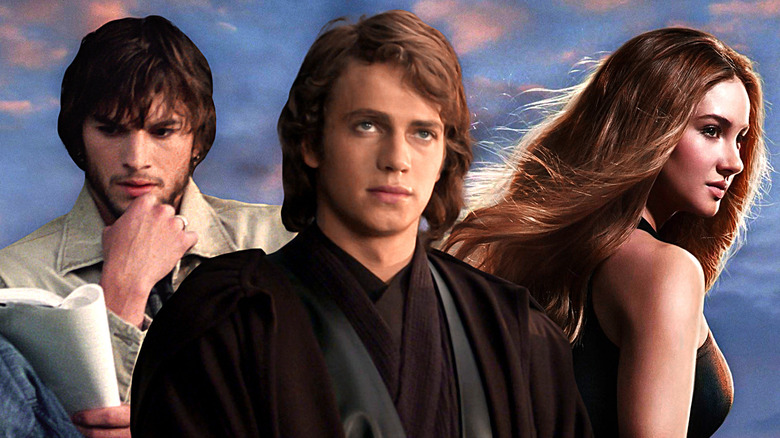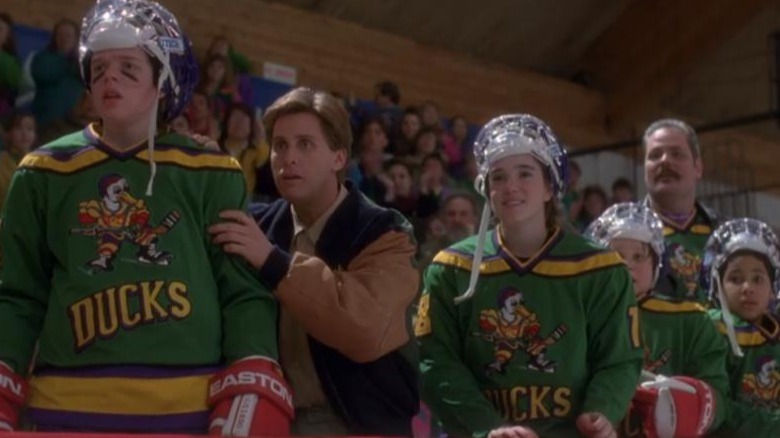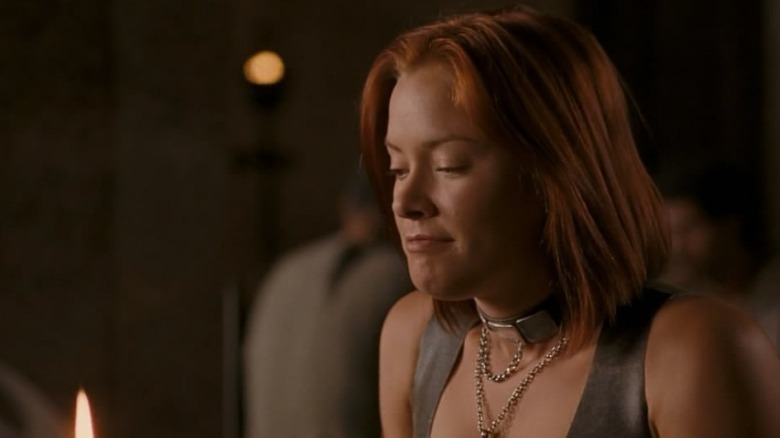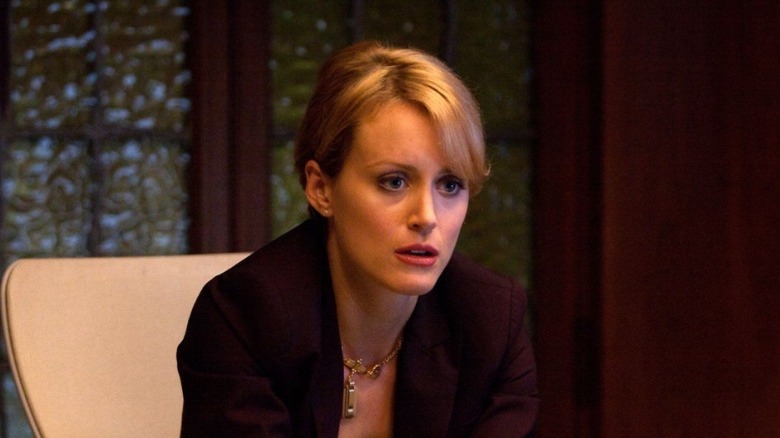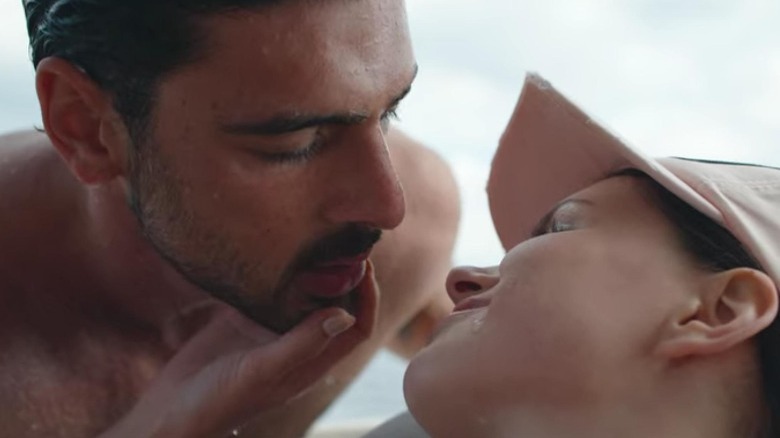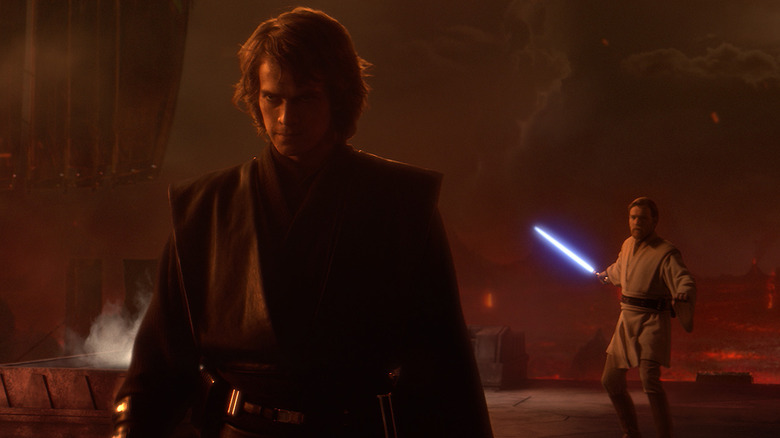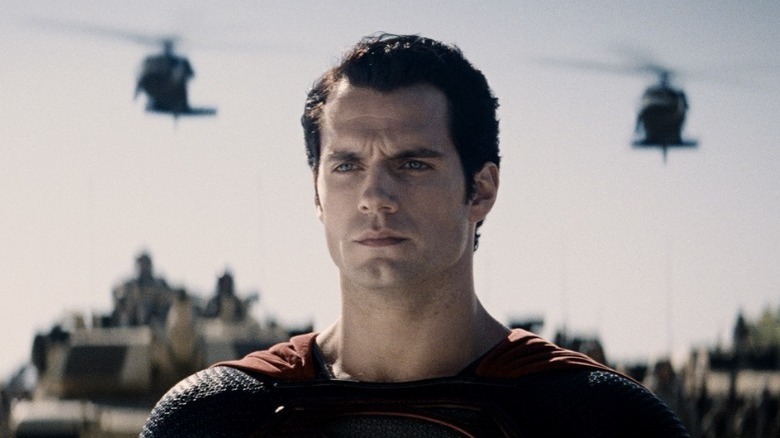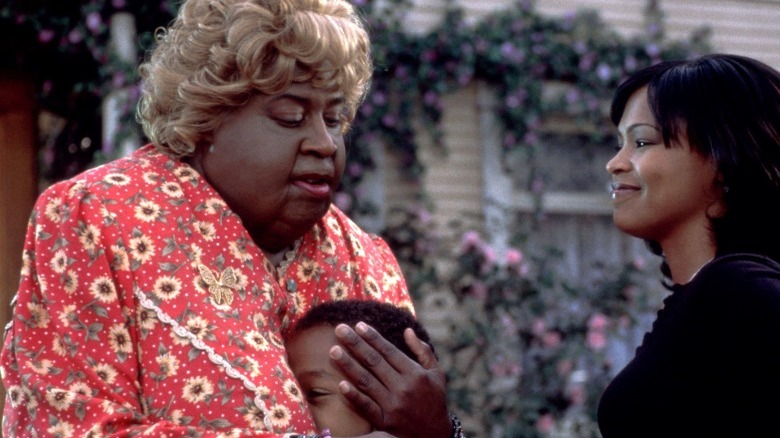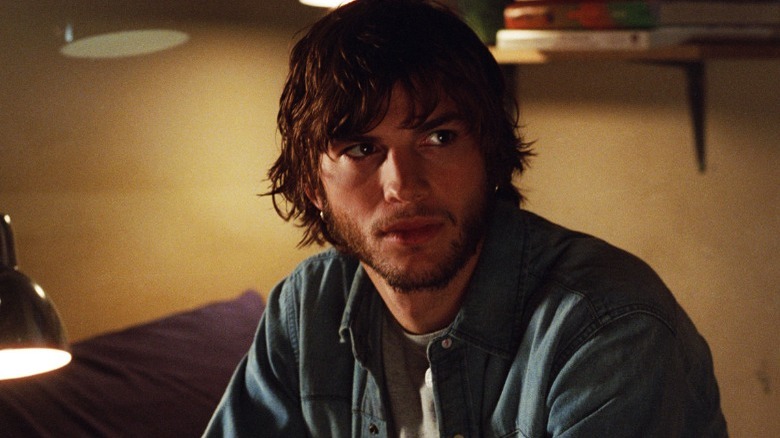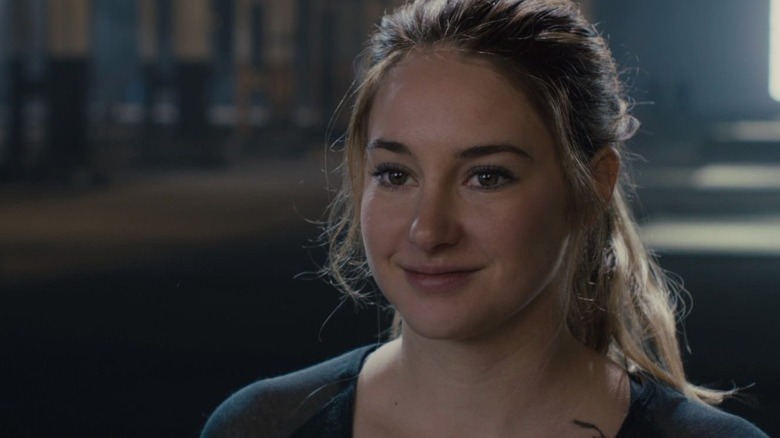Movie Trilogies That Don't Have A Single Good Film
Trilogies are commonplace in the world of movies, and for good reason. They can often be a win-win for viewers and filmmakers, allowing us to experience more of a setting and characters that we love while allowing studios to make more money and tell a complete story. The very best trilogies have the opportunity to go down in history, with the likes of the original "Star Wars" trilogy, "The Lord of the Rings," and "Back to the Future" establishing themselves as popular culture milestones permanently.
Of course, that doesn't mean that every trilogy is great. Some of them might vary in quality between installments, with the second entry in the series being the best, while others slowly improve over time and end on a high. Regardless, there's always likely to be at least one good film in any trilogy — otherwise, studios would have no incentive to create more.
That is not always the case, though, and there are some rare examples of movie trilogies that don't have a single good film. Yet, even with spectacularly bad starts, two more sequels were bafflingly greenlit and put into production to create the worst trilogies ever made.
The Mighty Ducks
Including "The Mighty Ducks" might seem like sacrilege for some people, as the film has become something of a cult favorite over the years, but there's little arguing that it failed to make any sort of impression on critics when it first hit cinema screens in 1992. In fact, the movie wasn't even a huge financial success, making just $50 million at the box office. None of that stopped Disney from releasing two successive films and, more recently, a television spin-off series in the form of "The Mighty Ducks: Game Changers."
The first entry in the series follows Gordon Bombay (Emilio Estevez) as he is forced to carry out community service by helping to coach a local children's ice hockey team. Although he initially dislikes his new responsibilities, the attorney quickly comes around and finds enjoyment in helping the young players win the championship against all odds.
If that sounds like a fairly predictable plot for a sports film, you wouldn't be wrong — and that was behind much of the criticism against "The Mighty Ducks." 1994 saw the release of "D2: The Mighty Ducks," which was then followed two years later by "D3: The Mighty Ducks," neither of which fared much better in reviews or at the box office. In fact, the only well-reviewed release has been the recent television series.
BloodRayne
Uwe Boll is one of the few directors whose filmography is made up of terrible films. In particular, he has been responsible for some of the worst video game movie adaptations – a genre that is not exactly gleaming with masterpieces. His earlier films, "Alone in the Dark" and "House of the Dead," are among the lowest-rated movies on IMDb, and "BloodRayne" soon joined their ranks when it was released in 2005.
Based on the video game series of the same name by Majestic Entertainment, "BloodRayne" acts as a prequel and shows the title character, a half-human, half-vampire portrayed by Kristanna Loken, attempting to find and kill her vampire father, Kagen (Ben Kingsley). Suffering from the same problems as Boll's other movies, "BloodRayne" has an unfocused narrative, awful dialogue, and below-par action sequences. Even the star-studded cast, which includes Michael Madsen, Meat Loaf, and Billy Zane, could do nothing to save the film.
Despite "BloodRayne" being a commercial and critical disaster, Boll pushed ahead with two direct-to-video sequels that no one asked for. 2007's "BloodRayne 2: Deliverance" had an even worse reception from reviewers, while the third film, "BloodRayne: The Third Reich," holds an IMDb rating of just three out of 10.
Atlas Shrugged
Ever since Ayn Rand's classic novel hit store shelves in the late 1950s, there has been interest in adapting the story for the big screen. That time finally arrived in 2010 with the release of "Atlas Shrugged: Part I," the first in a three-part film series based on the book. The movies take place in a dystopian future where resources are scarce and the authoritarian government is increasingly taking control of powerful industries. This eventually prompts a strike by prominent industrial leaders, bringing the United States to a crippling halt. The first film was panned by critics and was a box office flop, grossing just $4.6 million against a budget of $20 million.
Even with those huge losses and a negative reception, producer and writer John Aglialoro continued to fund two further sequels. However, "Atlas Shrugged: Part II" and "Atlas Shrugged: Part III" both had smaller budgets and completely switched the cast for each release, meaning no actor portrays the same character across the series despite the fact that they were released just three years apart. The two sequels' performances at the box office were worse than their predecessors, grossing just over $4 million between them, and were even more harshly criticized for poor writing and wooden acting.
365 Days
"365 Days" is a 2020 erotic film that came out of Poland and eventually found its way to Netflix. The film follows Laura Biel (Anna-Maria Sieklucka), a young woman in a loveless relationship who ends up being kidnapped by a Mafia boss known as Massimo (Michele Morrone) after a chance encounter at an airport. Massimo intends to keep Laura captive for a year with the hopes that she will fall in love with him. That's a fairly problematic storyline already, which doesn't even take into account the frequent graphic violence and sexual assault that make up much of the viewing experience.
The first entry was universally panned, drawing the rare distinction of a 0% rating on Rotten Tomatoes. However, it set records in terms of being one of the most watched films on the streaming service. That led to Netflix producing two sequels that came to the service in 2022. Neither "365 Days: This Day" nor "The Next 365 Days" improved the formula, with critics berating the soap opera plot and questionable narrative that suggested women only want to be dominated in every aspect of their lives.
The Star Wars prequels
For those born in the last 30 years or so, it might seem inconceivable that between the time that the original "Star Wars" trilogy ended in 1983 and the start of the prequels in 1999, there were almost no "Star Wars" screen projects. After all, we are now used to a world filled with dozens of TV shows, video games, and movies based on the franchise. But that is exactly what happened, and this only increased the anticipation for the prequels to the point of near-mania, with fights even breaking out between fans as they tried to secure toys ahead of the launch of "Episode I — The Phantom Menace."
The prequels take place several decades before the original films, charting the demise of the Old Republic and the Jedi, along with Emperor Palpatine and Darth Vader's rise to power. But even with unprecedented excitement and a story that fans had always wanted to see, the prequels were a disappointment. Out of the 12 "Star Wars" movies that have been released so far, the prequels account for three of the six worst-rated on Rotten Tomatoes. Whether it is the laughably bad dialogue, the expansive use of CGI, or a story that focuses too much on politics and trade disputes, the "Star Wars" prequels pale in comparison to their predecessors.
Snyder's Superman trilogy
The DC Extended Universe has never quite managed to hit the heights of Disney's Marvel Cinematic Universe, largely because the three main movies featuring Superman, as well as other signature DC characters like Batman, failed to match the quality of competing superhero movies of the last two decades. Director Zack Snyder helmed all three "Superman" movies, which include "Man of Steel," "Batman v Superman: Dawn of Justice," and "Justice League."
All of those films feature Henry Cavill in the lead role, with support from prominent figures such as Ben Affleck (Batman), Gal Gadot (Wonder Woman), Jason Momoa (Aquaman), and Laurence Fishburne (Perry White). Yet all three of them failed to make much of an impact at the box office. The films grossed between $600 million and $874 million, numbers that don't sound terrible until you consider that they had budgets of at least $200 million to $300 million. Throw in marketing costs and the cut taken by movie theaters, and they may have just about broke even.
Of course, that doesn't even take into account the trilogy's critical reception. "Man of Steel" had the highest Rotten Tomatoes rating, with just 56% of critics having anything positive to say about the movie. Things went downhill from that rocky start, with "Justice League" and "Batman v Superman: Dawn of Justice" performing significantly worse. In fact, it took the release of the director's cut, "Zack Snyder's Justice League," in 2021 to get anything resembling a good movie.
Big Momma's House
You might think that a film with an all-star cast that included Martin Lawrence in the lead role and the likes of Paul Giamatti, Nia Long, and Terrence Howard in supporting roles would be a surefire winner. Unfortunately, that wasn't the case, and "Big Momma's House" is not exactly remembered as one of the best comedies of the 2000s. The movie follows Lawrence as an FBI agent who disguises himself as the grandmother of a key witness in order to find out information about money missing from an armed robbery.
There are some funny moments in "Big Momma's House," with Roger Ebert even noting that he laughed out loud at several points in his review. But the overall reception to the film was one of disappointment, with a feeling that the comedy quickly starts to drag due to its boring plot and one-joke mentality. However, the fact that it made $173 million against a budget of $30 million convinced the studio to release two additional films.
Considering that the entire concept of "Big Momma's House" had grown tired by the end of the first movie, basing two sequels on the same jokes and humor perhaps wasn't the best plan. "Big Momma's House 2," which saw Lawrence and Long reprise their roles, was a modest financial success but fared even more poorly with critics. The third entry in the series, "Big Mommas: Like Father, Like Son," made just over $80 million and faced almost universal disapproval.
The Butterfly Effect
2004's "The Butterfly Effect" is a sci-fi thriller that sees college student Evan Treborn (Ashton Kutcher) able to affect the past when he suffers from terrible headaches. During these episodes, Evan can effectively time travel and inhabit the body of his younger self. However, he soon finds that any changes, no matter how tiny, can have devastating and unintended consequences in the future. Making almost $100 million, the film was a modest financial success, which might explain why two sequels were produced. Yet the quality of "The Butterfly Effect" never quite matched its box office gross, with reviews criticizing the gratuitous violence and the way it wastes an interesting concept with such a dull plot.
What made the decision to create sequels to "The Butterfly Effect" even more bizarre is the way that the subsequent releases had almost nothing to do with the original, outside of the fact that they see characters go back in time to change events. "The Butterfly Effect 2" was a direct-to-video release that failed to live up to the low standards set by its predecessor. Meanwhile, "The Butterfly Effect 3: Revelations" didn't break new ground, examining the same ideas as the two previous installments with the same poor results.
Divergent
The film rights to Veronica Roth's young adult post-apocalyptic book series were snapped up not long after the first entry, "Divergent," hit store shelves. The franchise seemed like a sure hit since action-heavy films aimed at teenagers, like "The Hunger Games," "Harry Potter," and "Twilight," were already finding plenty of success. The three movies take place in a dystopian future where humanity is split into five distinct groups, with protagonist Tris Prior (Shailene Woodley) existing outside these classes as a Divergent, prompting her to start an uprising.
The trilogy got off of a rocky start and soon fell apart completely. 2014's "Divergent" grossed just $288 million and was panned for being too predictable, using tropes that were all too common in the young adult genre. Lionsgate pushed ahead, though, releasing "The Divergent Series: Insurgent" in 2015 to similar box office results and an even worse critical reception. The third and final entry, "The Divergent Series: Allegiant," was an even bigger disaster, just barely creeping over its production budget of $110 million.
Things got so bad by the time the third movie was released that Woodley claimed the experience almost made her quit acting altogether. Meanwhile, co-star Zoë Kravitz told Dax Shepard's "Armchair Expert" podcast, "I think as we went on, the story really kinda got lost and nobody really knew what we were doing anymore." It's little surprise then, after all of those issues, that a planned fourth film was shelved, leaving the series incomplete.
